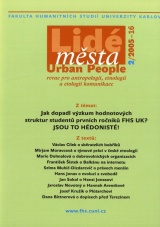Týmová práce v české etnologii druhé poloviny 20. století
DOI:
https://doi.org/10.14712/12128112.3896Abstrakt
This contribution addresses two topics in context of social reality: Theoretical framework of team field research and cognitive results of this research and their impact on diversification of theoretical thinking in Czech ethnology. Within this interpretive context there are four levels of team research work being discussed: 1) Examination and systematic mapping of fast disappearing traditional tangible and spiritual folk culture; 2) Examination of proletariat, industrial regions and towns, outlined as historical-ethnographical analysis trying to define development trends and interpret changing commonness in context of modern Czech social life; 3) Examination of “contemporary village“ in order to document and interpret cultural changes, record transformation of the “pre-socialist“ social hierarchies, as well as disappearance or transformation of traditional ways of village social life; 4) Examination of integration and disintegration processes in society, targeted to different ethnic groups, re-emigration groups, and groups of expatriates living abroad. The first four decades of the second half of the 20th Century, gave rise to conditions, within its social framework, for team research work of ethnologists – regardless the fact that the program was limited and dictated theoretical, thematic, as well as problem direction of this scientific work. Broad platform was set up for team research activities, even though this platform was limiting and compulsory selective. In the last decade of the 20th century, this former institutionalized platform was restructured. The new platform provided extensive and fundamental space for personal initiative. Conditions were set up for liberal approach to selection of research problems, as well as theoretical assumptions for its solution, selection of methods and techniques of research work. Team research became based on social demand and scientific goals of the researchers. Team research work of the entire second half of the 20th Century is closely tied with deep understanding of the Czech traditional folk culture development. However, it is also closely related to development of the Czech ethnology, modernization of the field, gradual re-definition of the ethnological objects studied in its framework, and expansion of thematic and problem categories. It also involves re-evaluation of social significance of ethnographic facts and their discursive processing.
Stahování
Publikováno
Jak citovat
Číslo
Sekce
Licence

Tato práce je licencována pod Mezinárodní licencí Creative Commons Attribution-NonCommercial-NoDerivatives 4.0.


